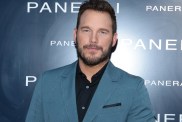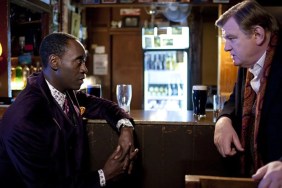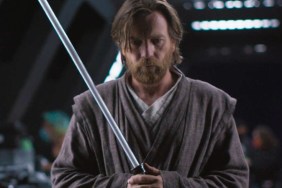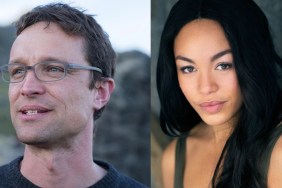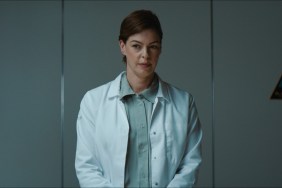“I’m not a big fan of Irish movies. I’m not a big fan of British movies either. They’re all very small, grimy, they’re usually set in London or Dublin, and they’re usually about people who are scumbags, as far as I’m concerned. As I was making this film I was trying to do the antithesis of all that.” – John Michael McDonagh, writer/director of Calvary.
Jovial, redheaded Irishman Brendan Gleeson was a teacher in Dublin only a few years before his kilt-wearing breakout performance in Best Picture-winner Braveheart. A slew of battle-ready character parts in big budget spectacles followed, including Gangs of New York, Cold Mountain, Troy, Kingdom of Heaven and Beowulf, not to mention his signature role as “Mad-Eye” Moody in the “Harry Potter” series.
In recent years, he’s branched out into starring roles in the dark crime comedy In Bruges, directed by Martin McDonagh, and then to The Guard, helmed by McDonagh’s brother John Michael McDonagh. Now the latter McDonagh and Gleeson have reteamed for the second part of their informal trilogy titled Calvary (not to be misspelled as “Cavalry”), which follows a decent priest named Father James targeted for murder by a man who was molested as a child by another priest.
“It’s the nightmare confession, isn’t it?” says Gleeson of the opening scene of the film in which he’s given a week to live before being murdered. “The sins of his congregation have come home to roost and become visited on him. It’s not that it’s going to cost him his life, it’s the fact that someone in his community is guilty of inflicting this pain on somebody. He has to confront this aspect of the priesthood.”
The film is structured like a whodunit, or really a “who’ll-do-it.” Father James encounters several men–played by the likes of Chris O’Dowd, Dylan Moran, Pat Shortt and Aidan Gillen–who could all be the potential/eventual murderer. He knows which one it is, but we as an audience are left to wonder.
“You’re introducing these characters and you know there has to be a sinister element to all of them,” McDonagh says of his carefully structured script. “You’re trying to not be repetitive, but they also have to be the person who may be the killer as well. You’re trying to find those nuances that make them different but also make them sinister.”
“Obviously you couldn’t betray anything,” Gleeson admits, “but in the scenes with who it eventually turns out to be there was an added layer, but I couldn’t necessarily show it. In the end it was less about who was going to do it and more about how you face down all that vitriol and despair. I think his own demons are as big a battle as anyone in the town’s, really.”
While Catholicism plays a huge part of Irish culture (“Or it used to,” adds McDonagh) one wonders how Calvary would be different if it took place in rural United States or rural Italy as opposed to the small hillside Irish village in the film.
“I don’t think it would be any different in rural Italy,” Gleeson opines. “I think it would be different in the United States partially because there has been such a clear delineation between church and state. When people get very disillusioned about authority in the United States, which is true if you look at the voting figures, they don’t see it as part of the state’s failure. From the reaction in the States so far it is not merely about the Irish situation or the Catholics, it’s about the preservation of faith when leadership is lost.”

“It’s not meant to be about a parochial Irish town,” McDonagh adds. “It’s meant to be a universal film. Christian organizations seem to understand that we’re talking about human issues, philosophical issues that human beings go through every day of their lives. It can play anywhere. It could be in Spain, it could be in Italy, it could be in Latin America. It doesn’t matter. We’re all human beings and we’re all going to die. We all have to face that fact at some point in our lives, and this film is kind of about that.”
Having Gleeson around for his second feature proved a boon both creatively and financially after the success of The Guard, which became the most successful Irish film of all time.
“We trust each other after ‘The Guard,'” McDonagh says. “He knows I won’t ask him to do something I don’t think is true, and I trust him to give me notes that are based on making the film better and not based on ego and not making his role better. On a pragmatic level, making a movie in Ireland with Brendan gives me half the budget already. The success of ‘The Guard’ was so big that just announcing making a movie with Brendan, and then when Chris O’Dowd got involved I think I had the budget then for ‘Calvary.’ That takes a lot of pressure off me. I could do whatever I wanted with the movie.”
As for the difference between John Michael and his famous brother Martin, Gleeson has played a pivotal role in both their careers but wouldn’t want to compare them.
“They have different sensibilities,” Gleeson admits. “Their words are different. I can’t imagine any of those characters being in the other one’s film. I can’t imagine Father James being in ‘In Bruges.’ They have a lot of things they share, the vigor of their writing, the dialogue they seem to effortlessly maintain. The worlds are most definitely different. I don’t want to think about defining what those differences are.”
One aspect that characterizes both brothers is their ability to balance black humor and stark tragedy and violence, a balancing act that John Michael found particularly tricky navigating during Calvary.
“It was only in the editing that I started to think about the balance between scenes that have some light relief and scenes that are forbodingly dark,” McDonagh admits. “In the script there’s a sequence where Kelly Reilly is in the confessional with Brendan talking with her father about suicide, and that was followed by the scene of Domhnall Gleeson as the serial killer in prison. Those are two really dark scenes in a row that are both confessional scenes, so I moved them around, put a scene in between them just to relieve the overwhelming somber feeling. I knew when I was writing the script that it was episodic, and that I can move scenes around without affecting the plot.”
A third film, The Lame Shall Enter First, will ultimately tie this informal trilogy of The Guard and Calvary together. Funding should not be a problem, as Calvary has already proved just as successful in Ireland and Australia as its predecessor.

“It’ll be the final attack on society,” McDonagh says of the third entry. “Brendan is a paraplegic in a wheelchair and he hates people who are able-bodied, so he basically hates the entirety of society. Where Gerry Boyle doesn’t get along with humanity and Father James is trying to get along with humanity, this third character doesn’t care about humanity at all. That will be the conclusion. I’m hoping it’ll be a box set called ‘Glorified Suicide Trilogy’ and we’re hoping we’ll make that next year.”
As for Gleeson, he has his sights on adapting Flann O’Brien’s metaphysical novel “At Swim-Two-Birds” as his directorial debut, despite the material being called “unadaptable.” That may prove true, as he’s currently taking a break from the project after difficulty finding funding.
“I think cinema is made for Flann O’Brien,” Gleeson says of the surreal satirist, “and ‘At Swim-Two-Birds’ in particular is about a student who’s writing a book about a guy writing a book about a guy writing a book. It’s so involved with itself that the layers are so multifaceted, but it’s made for cinema. You can bring people into a world and they can accept it if you set it up properly. It seems to be one of those things that the form of cinema allows you to do–apart from the novel, obviously–that no other art form will allow you to do. My vision of it is not without its challenges, but I think the entertainment value of the characters that he writes in a multilayered world will make cinematic sense.”
The amiable actor also briefly discussed his son Domhnall Gleeson’s casting in Star Wars: Episode VII and how the onslaught of fame might affect him once the movie comes out in late 2015.
“Well he would have been around when I was still teaching, so he has a fair idea about the nature of all that,” said Gleeson. “He hasn’t been used to it. He’s known the pitfalls, and he’s taking it as it comes. You can’t really count on this kind of response to something that hasn’t happened yet with any degree of certitude. You have to just be prepared to keep yourself safe and see how it all turns out. He’s kind of beyond advice now, to be honest.”
When prompted if he himself would be interested in taking part in a future “Star Wars” installment, what with the family connection as well as his legacy of playing old sage warrior types in movies like Beowulf and Braveheart, he let out a hearty laugh.
“Listen, I’d read the script, I’ll put it that way,” Gleeson says. “It’s an amazing phenomenon, you know? Good luck to him, I’m curious to see how it all works out. I have to say I was a little bit unprepared for the excitement that resulted from his casting. Myself I wasn’t expecting that level of frantic interest. It’s amazing. It really is a phenomenon.”
Domhnall Gleeson has a small cameo role with his father in Calvary, which opens in limited release on August 1.
Calvary
-
Calvary

-
Calvary

-
Calvary

-
Calvary

-
Calvary

-
Calvary

-
Calvary

-
Calvary

-
Calvary

-
Calvary

-
Calvary

-
Calvary



